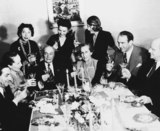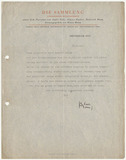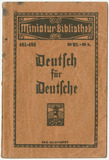Bruno Frank
Diese warme, reiche Menschlichkeit, (…) diese Treue, diese Generosität, dies urbane Lächeln bei solchem Wissen um die dunkelsten und schwersten Dinge – wo finden wir es wieder?
[This warm, rich humanity, (...) this loyalty, this generosity, this urbane smile despite such knowledge of the darkest, hardest things – where will we find its like again? (ed. trans.)]
Klaus Mann writing about the death of Bruno Frank in a letter to Liesl Frank, 30 June 1945
| Born | on 13 June 1887 in Stuttgart |
|---|---|
| Died | on 20 June 1945 in Beverly Hills, Californien, USA |
| Exile | Switzerland, France, Great Britain (United Kingdom), Austria, United States of America |
| Profession | Writer |
Writer Bruno Frank left Germany immediately after the Reichstag fire of February 1933. As a Jew and a democrat, he abhorred National Socialism. Frank and his wife Liesl initially went to Switzerland. At the beginning of 1934, they moved on to France and settled in Sanary-sur-Mer, where they met Lion Feuchtwanger and many other exiles.
Although Bruno Frank did not publish any political statements in the exile press, he supported the journal “Die Sammlung” (The Collection), which was initiated by Klaus Mann with the intention of bringing together various literary and political positions in exile but was ultimately doomed to failure. Frank’s involvement with the P.E.N. Club was limited: he declined an invitation to speak at the XII International P.E.N. Congress in Glasgow in June 1934 because he was working on his novel “Cervantes” (1934).
From 1935 until 1937, Bruno and Liesl Frank divided their time between London and Salzburg. Frank became particularly popular in London for the English-language version of his theatre play “Sturm im Wasserglas (1930; engl. Storm in a Teacup, 1936). This was also where he began working on his novel “Der Reisepass” (The Passport, 1937), which called for open literary confrontation with National Socialism.
In 1937, the Franks moved on to the USA and settled in California, where Bruno Frank’s projects included a variety of screenplays. Bruno and Liesl Frank both used their extensive networks to support other artists who had emigrated to the USA.
Selected works:
Trenck (Novel, 1926)
Politische Novelle (Novelle, 1928)
Sturm im Wasserglas (Theatre play, 1930)
Cervantes (Novel, 1934)
Der Reisepaß (Novel, 1937)
Further reading:
Kirchner, Sascha: Der Bürger als Künstler. Bruno Frank (1887-1945). Leben und Werk, Düsseldorf: Grupello 2009.







